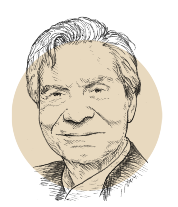France-Amérique: Unlike in the United States, female rabbis are not commonplace in France. There are only four of you, in fact. Was your calling to become a rabbi or rather to revolutionize patriarchal Judaism by becoming a female rabbi?
Delphine Horvilleur: My journey was quite different. I have a passion for listening to others and helping them, which led me to journalism and medical studies. I later reconnected with my family tradition when I rediscovered that Judaism is founded on listening and helping others. I have never considered myself to be a rebel, as the Jewish tradition is to question tradition itself. I would also add that being a woman, Jewish, and a rabbi is not a transgression because no one can define Judaism. It is a nomadic school of thought redefined by each generation. Those who accuse me of transgression and treason, who try to resist the growing number of female rabbis, do not understand our tradition of questioning.
You became a rabbi in New York City because it was impossible in Paris. How do you explain this French resistance to increased female participation?
Women can only become rabbis in the United States, London, and Israel. In France, a course is being developed between Paris and London. This French resistance to including more women, which particularly contrasts with the United States, can be explained by our differing histories. In France, Napoleon I organized Judaism according to a centralized model comparable to the Catholic Church, along with a consistory and a chief rabbi. This centralization put a stop to any sort of evolution and consolidated the patriarchal aspect of Judaism. By contrast, pluralism is the norm in the United States, where the government has no say in the organization of religions. I sometimes say that French Judaism is Catholic and American Judaism is Protestant. This is how religious innovation developed in the United States, including the rise of female rabbis. What’s more, the rigid concept of laïcité in France is not exactly a driver of religious innovation. For those who champion secular views, a religion cannot be inherently progressive. The fact that women are being involved in synagogues, churches, and mosques contradicts secular prejudices according to which religions are naturally conservative and therefore antifeminist.
Is feminism, with #MeToo as its most recent expression, shaking up all patriarchal religions?
It didn’t take #MeToo for me to become a rabbi. I actually became a rabbi in 2008, and my school upheld gender parity even then. However, it is true that #MeToo and other similar movements are shaking up all religious institutions. This revolution will also inevitably provoke a counter-revolution. The refusal of female participation is expressed in a hypocritical stance celebrating the eternal feminine and women as custodians of spirituality. This is little more than conservative nonsense aimed at fighting feminism without admitting to it.
Your Parisian synagogue attracts a younger following than traditional places of worship presided by elderly rabbis. What do you think appeals to them?
Places of worship are usually chosen based on location: the church, temple, mosque or synagogue nearest your home. In my case, it’s different. People come to me for idealistic reasons and are generally looking for gender equality and even conversions and interfaith weddings. Many parents come to my synagogue when they want their children to receive the same education regardless of gender. It has to be said that my liberal, open stance is not an easy one to uphold in this time of communitarian withdrawal. Many Jews feel threatened by anti-Semitism and prefer to stay at home. This urge to withdraw affects all communities.
Do you fear anti-Semites, atheists, the indifferent public, or Orthodox Jews?
I don’t fear any of them! I am from an Orthodox family and have a real fondness for their vision of tradition. The thing I fear the most today is the foolish obsession with identity, the whole identitarian ideology that reduces humanity to a narrow, closed idea of its origins.
Vivre avec nos morts by Delphine Horvilleur, Grasset, 2021.
Interview published in the May 2021 issue of France-Amérique. Subscribe to the magazine.












